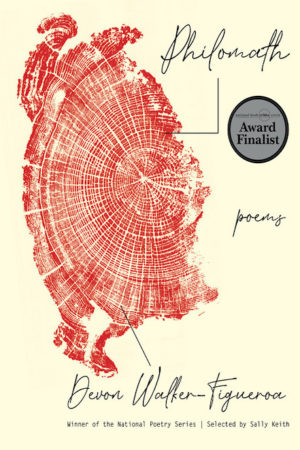Philomath
by Devon Walker-Figueroa
reviewed by Katie Berta
“‘Love of learning’ is what / Philomath means,” Devon Walker-Figueroa announces in the first line of her book, Philomath, which was selected for the National Poetry Series in 2020. Philomath is also the name of the ghost town where the book’s speaker grew up (a city of about five thousand in Benton County, Oregon, about five miles from Corvallis), and Walker-Figueroa spends many of the book’s pages unearthing this irony: of small-town life and small-town people alongside our genteel associations with the Greek word. The first poem, titled after the collection, the town, and the word, paints a picture of a place that is in striking contrast to its speaker and its name, where “what kids are here hang out / in gravel parking lots & hunt / pixelated deer at The Woodsman” and where
Megan is still giving out
blow jobs to mechanics & drinking
red cough syrup until she doesn’t
care about her step-
dad walking around, covered in nothing
but sweat & dirt.
At the same time, Walker-Figueroa’s project is to plumb the interchange between place and person. Like William Carlos Williams’s Paterson, Philomath maps a speaker onto a real place, and, even more, asserts, in Williams’s words, “that a man himself is a city.” That the city Walker-Figueroa chose to animate is a ghost town is particularly significant to her experiences there.
The “I” of this collection isn’t sure whether she can fit into this place. While “Megan spends / breaks in the bathroom & I know not / to follow her,” the speaker goes
[ … ] to the library, where I check out
A Season in Hell because they don’t
have Illuminations & never will & I feel alone
around all the smart kids who raise up
pigs to pay for college.
Here, even the smart kids aren’t quite what she’s looking for. In the poem “Golden,” we get a whiff, perhaps, of racial tensions felt by the speaker and her family when the speaker’s family talks
[ … ] of changing
our name to Golden,
as if we were a family plucked
from the pages of What
a Jolly Street, pastel place
where every daughter is
blonde.
At the same time, she acknowledges,
I am me and all I take
in exists merely as this me, though without
requiring me; every you also
a me.
Even in light of the tension she feels with this place, the speaker understands that she is made up of it—and, even more, that it is made up by her. This interchange, with the viewer’s perceptions making the place and the place making the viewer, who is its inhabitant, creates one of the main pressures in the collection and rings against another of its main threads: the speaker’s mother, who has passed away. The speaker must contain, too, what the mother was. As she says in “Damp Room,” “It’s entirely up to me to remember // what you said.”
This isn’t just a ghost town, then, of erstwhile colonials (as in the poem “Kings Valley,” whose eponym is “a place known for its dead / settlers & Xmas trees. There’s a whole / cemetery for land-claimers here”), but also a personal ghost town for the speaker. In “Persistence of Vision,” she “drive[s] to the lookout you never tired of” to spread her mother’s ashes but also dreams she’s
[ … ] many
things, sometimes a lamp shedding
her halo on the scene
of a crime no one knows
to call a crime. [ … ]
But lately, I’m a dormitory
full of nightgowned girls, and I
burn so fast no one can touch
me.
In another section of the poem, she is “the prison / guard” who is “bribed by faith / into bringing a new- / born to the cell of a martyr,” St. Perpetua. The speaker’s grief shifts in its shape and intonation but possesses her, changes her shape, too. In “My Materia,” she’s
[ … ] fixed the image of [her mother’s] brain
(magnetic/resonant)
to my father’s light
table, the one he used in crafting maps, to find the small stain inhabiting
the corner of her/the mind in which place-finding occurs in which place
cells ignite in the image of the navigable, of the at-hand.
The mother’s brain becomes a map—and also cannot understand where she is. She is unplaceable, lost, and, like the ghost town, still there, imminently findable. As in the painting “Materia” by Umberto Boccioni, to which the poem responds,
[ … ] all planes exist
pellucid, irradiated
by a warmth that cannot be said to be external, in which the human and the in-
human (but alive)
writhe in place, oscillate
below and within
the artist’s mother, who is the subject.
The mother, now, is diffuse, which allows her lines to blur. Like the different characters in “Persistence of Vision,” like Philomath itself, she is the speaker: “I am me and all I take / in exists merely as this me”; “every you also / a me.” “My Materia”—the material of me, and also, in “Mater,” my mother. The speaker is made of the mother’s blood. She can use the map of her brain—and, similarly, the map of Philomath—to navigate her self. For her, though, there is only so much comfort in this kind of closeness. Just as the mother has departed from her, she must separate from her home. As she says in the collection’s last poem, “Gallowed Be,”
[ … ] Every story is
ashamed to be true. My father’s now
a widower, & no one
is to blame. My sister
doesn’t laugh, plots to live
on land turned tame.
Published on September 27, 2022

